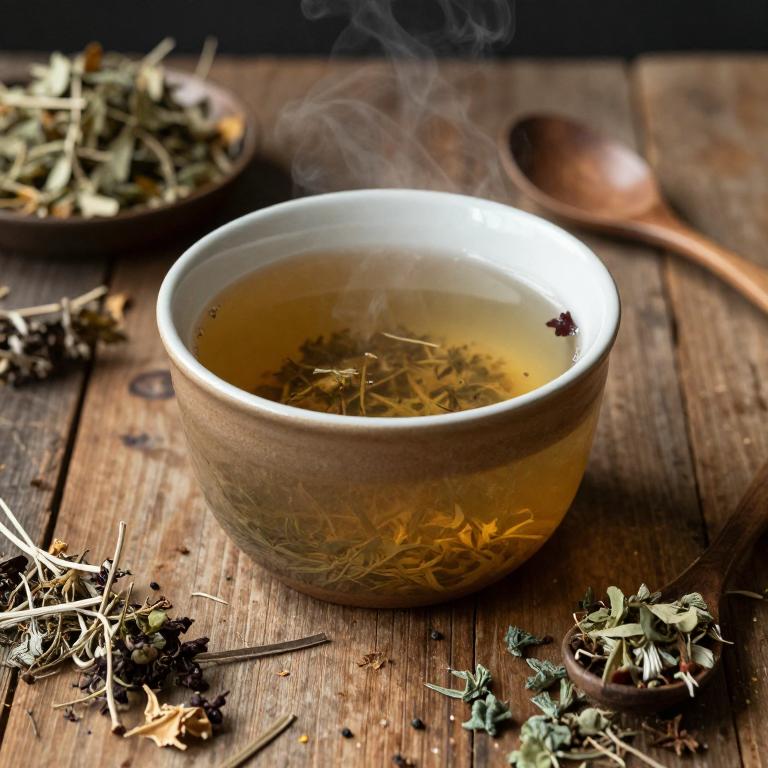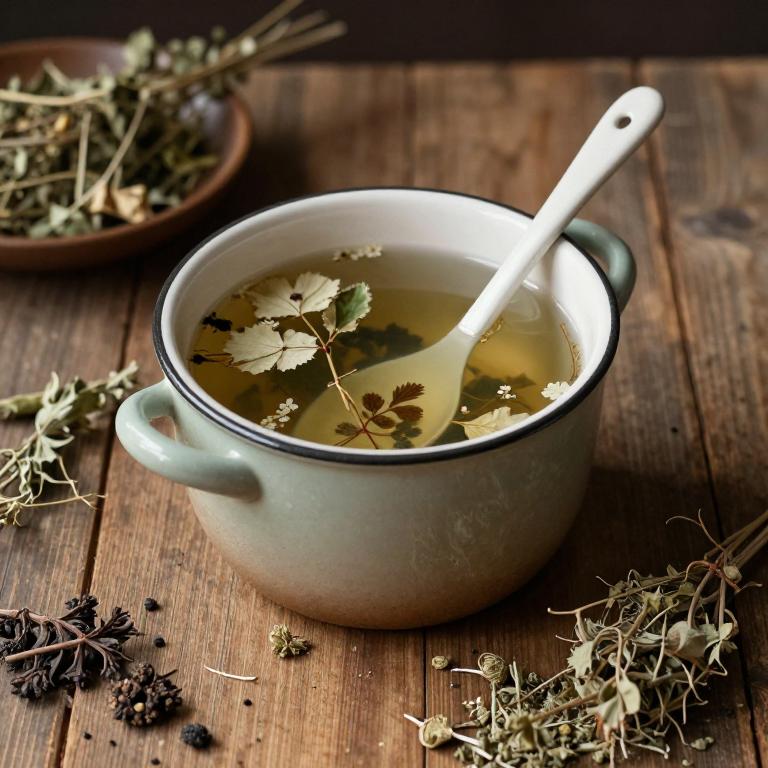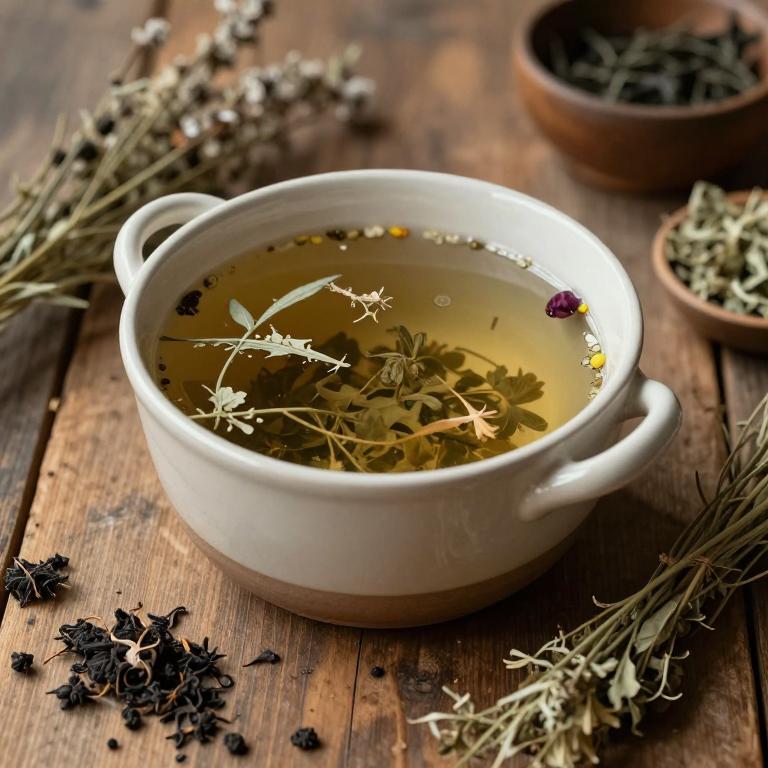10 Best Herbal Decoctions For Sinusitis

Herbal decoctions have been traditionally used to alleviate symptoms of sinusitis by promoting drainage and reducing inflammation in the nasal passages.
Commonly used herbs include eucalyptus, ginger, garlic, and nettle, which possess antimicrobial and anti-inflammatory properties. These decoctions are typically prepared by boiling the herbs in water and then allowing the liquid to steep, creating a potent herbal infusion. Many people find relief from congestion and sinus pressure through regular use of these natural remedies.
However, it is important to consult with a healthcare provider before using herbal decoctions, especially for chronic or severe cases of sinusitis.
Table of Contents
- 1. Ginger (Zingiber officinale)
- 2. Eucalyptus (Eucalyptus globulus)
- 3. Salvia (Salvia officinalis)
- 4. Stinging nettle (Urtica dioica)
- 5. Thyme (Thymus vulgaris)
- 6. Rosemary (Rosmarinus officinalis)
- 7. Catnip (Nepeta cataria)
- 8. Turmeric (Curcuma longa)
- 9. Ceylon cinnamon (Cinnamomum zeylanicum)
- 10. Black pepper (Piper nigrum)
1. Ginger (Zingiber officinale)

Zingiber officinale, commonly known as ginger, has been traditionally used in herbal medicine for its anti-inflammatory and antimicrobial properties.
Herbal decoctions made from fresh or dried ginger roots are often prepared by simmering the root in water to extract its active compounds, such as gingerol and shogaol. These decoctions are believed to help alleviate symptoms of sinusitis by reducing nasal congestion and inflammation in the sinus passages. The warming effects of ginger may also help to clear mucus and improve respiratory function.
While some studies suggest potential benefits, further research is needed to fully understand its efficacy and mechanisms in treating sinusitis.
2. Eucalyptus (Eucalyptus globulus)

Eucalyptus globulus, commonly known as the blue gum eucalyptus, is widely used in herbal decoctions for the treatment of sinusitis due to its potent anti-inflammatory and antimicrobial properties.
The leaves of this plant contain essential oils, such as cineole, which help to reduce nasal congestion and alleviate inflammation in the sinus passages. Herbal decoctions made from eucalyptus globulus are often prepared by boiling the leaves in water to extract their active compounds, making them easy to consume as a tea or steam inhalation. These natural remedies are favored for their mild side effect profile compared to conventional pharmaceuticals, though they should be used under the guidance of a healthcare professional.
While eucalyptus globulus can provide symptomatic relief, it is typically recommended as a complementary therapy rather than a standalone treatment for chronic sinusitis.
3. Salvia (Salvia officinalis)

Salvia officinalis, commonly known as sage, has been traditionally used in herbal medicine for its potential anti-inflammatory and antimicrobial properties, making it a candidate for the treatment of sinusitis.
Herbal decoctions made from dried sage leaves are prepared by simmering the plant material in water to extract its active compounds, such as thujone, rosmarinic acid, and flavonoids. These decoctions may help reduce nasal congestion and inflammation by soothing the mucous membranes in the sinuses. Some studies suggest that sage may inhibit the growth of bacteria commonly associated with sinus infections, such as Streptococcus pneumoniae.
However, while anecdotal evidence supports its use, more clinical research is needed to fully validate its efficacy and safety for treating sinusitis.
4. Stinging nettle (Urtica dioica)

Urtica dioica, commonly known as stinging nettle, has been traditionally used in herbal medicine for its anti-inflammatory and immune-supporting properties.
A decoction of Urtica dioica leaves can be prepared by boiling the fresh or dried leaves in water for several minutes, then straining the liquid for consumption. This herbal remedy is believed to help alleviate symptoms of sinusitis by reducing nasal congestion and inflammation in the sinuses. Some studies suggest that the plant contains compounds such as histamine and flavonoids that may contribute to its therapeutic effects.
However, it is important to consult with a healthcare professional before using Urtica dioica, as it may interact with certain medications or cause allergic reactions in some individuals.
5. Thyme (Thymus vulgaris)

Thymus vulgaris, commonly known as thyme, has been traditionally used in herbal medicine for its potent antimicrobial and anti-inflammatory properties.
Herbal decoctions made from thyme are often prepared by simmering the dried leaves and flowers in water to extract their active compounds, such as thymol and carvacrol. These compounds are known to help reduce nasal congestion and combat bacterial infections associated with sinusitis. Thyme decoctions may support the body's natural immune response and alleviate symptoms like nasal discharge and facial pain.
However, it is advisable to consult a healthcare professional before using thyme as a treatment, especially for chronic or severe cases of sinusitis.
6. Rosemary (Rosmarinus officinalis)

Rosmarinus officinalis, commonly known as rosemary, has been traditionally used in herbal medicine for its potential benefits in treating sinusitis.
Rosemary herbal decoctions are prepared by simmering the dried leaves in water, creating a potent infusion rich in antioxidants and anti-inflammatory compounds. These decoctions may help reduce nasal congestion and alleviate symptoms associated with sinus inflammation due to their antimicrobial and decongestant properties. Studies suggest that the essential oils in rosemary, such as cineole, can support respiratory health by thinning mucus and improving sinus drainage.
While rosemary decoctions can be a complementary therapy for sinusitis, it is advisable to consult a healthcare professional before using them, especially for prolonged or severe cases.
7. Catnip (Nepeta cataria)

Nepeta cataria, commonly known as catnip, has been traditionally used in herbal medicine for its potential benefits in treating sinusitis.
The plant contains compounds such as nepetalactone, which may help reduce inflammation and alleviate nasal congestion. Herbal decoctions made from dried catnip leaves are often prepared by steeping them in hot water for several minutes. These decoctions are believed to promote drainage of the sinuses and ease breathing by acting as a mild decongestant.
While some studies suggest possible anti-inflammatory and antimicrobial properties, more research is needed to fully establish its efficacy for sinusitis.
8. Turmeric (Curcuma longa)

Curcuma longa, commonly known as turmeric, has been traditionally used in herbal medicine for its anti-inflammatory and antimicrobial properties.
Herbal decoctions made from curcuma longa involve simmering the rhizomes in water to extract active compounds such as curcumin, which is believed to contribute to its therapeutic effects. These decoctions are often used in complementary therapy for sinusitis due to their potential to reduce nasal congestion and inflammation of the sinus passages. Studies suggest that curcumin may inhibit inflammatory pathways and enhance mucus clearance, supporting respiratory health.
However, while some anecdotal evidence supports its use, more rigorous clinical trials are needed to fully establish its efficacy and safety for treating sinusitis.
9. Ceylon cinnamon (Cinnamomum zeylanicum)

Cinnamomum zeylanicum, commonly known as Ceylon cinnamon, has been traditionally used in herbal medicine for its anti-inflammatory and antimicrobial properties.
Herbal decoctions made from its bark are believed to help alleviate symptoms of sinusitis by reducing nasal congestion and fighting respiratory infections. The active compounds in cinnamon, such as cinnamaldehyde and eugenol, contribute to its ability to soothe irritated mucous membranes and improve sinus drainage. These decoctions can be prepared by simmering the bark in water and consuming the resulting infusion several times a day.
While generally considered safe, it is advisable to consult a healthcare professional before using cinnamon decoctions, especially for individuals with allergies or chronic sinus conditions.
10. Black pepper (Piper nigrum)

Piper nigrum, commonly known as black pepper, has been traditionally used in herbal medicine for its potential anti-inflammatory and antimicrobial properties.
Herbal decoctions of black pepper may help alleviate symptoms of sinusitis by reducing nasal congestion and promoting mucus drainage. The active compound, piperine, is believed to enhance the body's natural immune response and reduce inflammation in the sinus passages. Some studies suggest that piper nigrum decoctions may have a synergistic effect when combined with other herbs like eucalyptus or ginger in treating chronic sinusitis.
However, further clinical research is needed to fully establish its efficacy and safety as a complementary therapy for sinusitis.